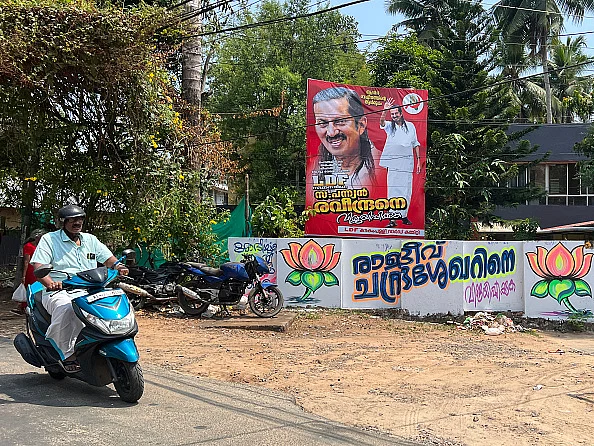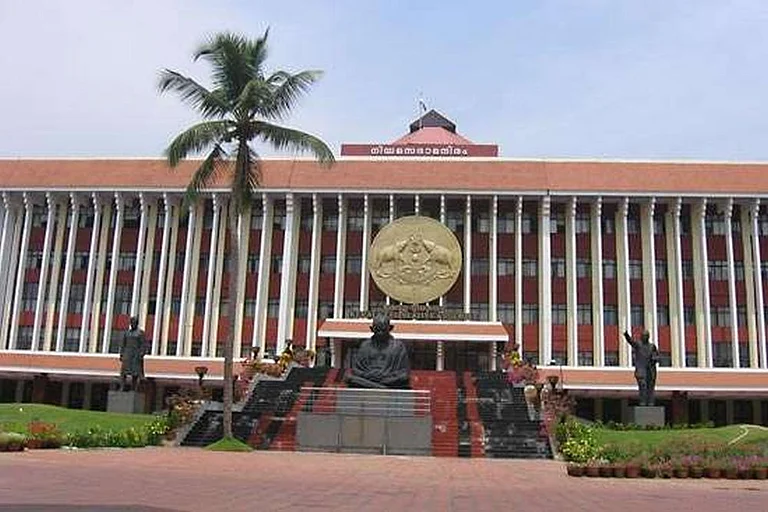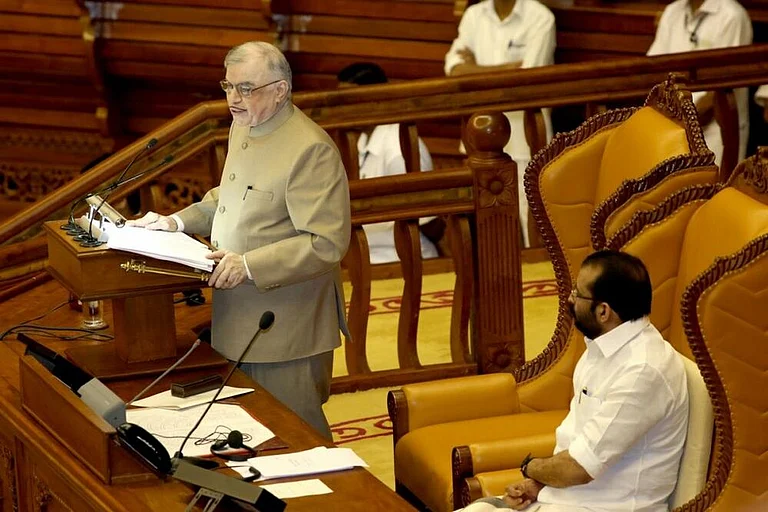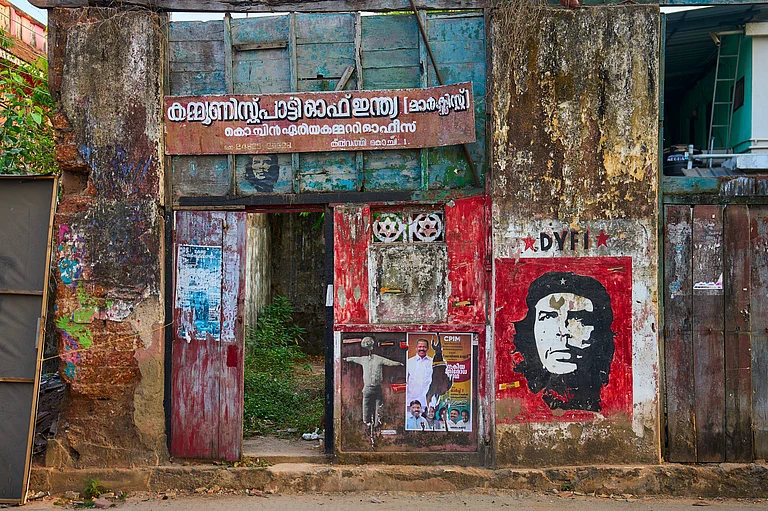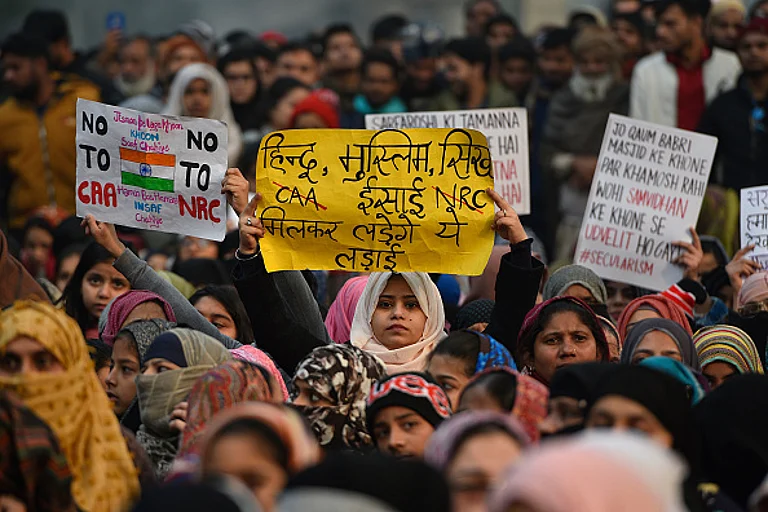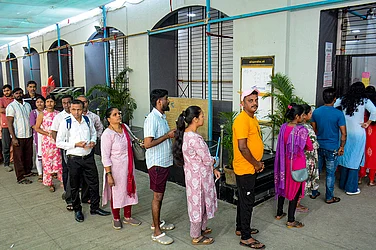The Campaign-From Kerala’s Financial Crisis To CAA
In Kerala, where politics deeply permeates the lives of the common people, the campaign for the 2024 polls commenced well in advance, gaining momentum by the end of February. The Left Democratic Front (LDF) made an early move, announcing its candidates in the final week of February and launching a vigorous campaign aimed at the Union Government for allegedly depriving the state of its rightful revenue share, thereby strangling it financially. Led by Chief Minister Pinarayi Vijayan, leaders and legislators from the LDF staged a protest at Delhi's JantarMantar accusing the Central government of unfair tax allocation and arbitrary borrowing restrictions imposed on the state.
The Supreme Court's favorable rulings on the state's petition under Article 131 further bolstered the campaign of the ruling CPI(M) and its allies. Meanwhile, the Congress-led United Democratic Front (UDF) lagged behind the LDF in candidate announcements and campaign initiation. Although the UDF managed to unveil its candidates only by the second week of March, they also commenced their campaign early.
Unlike the confrontational approach of the LDF towards the BJP and the Union Government, the UDF chose to highlight the government’s shortcomings, such as the disruptions in elderly pension distribution. Mariyakkutty, 78, a resident of Idukki, who symbolically protested by begging on the streets against the government's pension distribution failures, has become the ‘poster girl’ of UDF in their campaign. The LDF, in turn, defended the pension due by placing blame on the Union Government, crying discrimination against the state.
Mariyakkutty's story took a twist when she appeared on stage with the prime minister during an event in Thrissur on January 3. The UDF thereafter stopped bringing Mariyakkutty to their platforms.
CAA-The Game Changer
The notification of the Citizenship Amendment Act (CAA) on March 12 has become a game changer in Kerala's political landscape. Within hours, the CPIM and its youth wing, DYFI, mobilised onto the streets, organising night marches across the state led by prominent leaders and candidates. Congress orchestrated protest marches towards Central government offices, including railway stations. The Youth Congress resorted to blocking trains in a few places. However, the issue of anti-incumbency, including the pending pension dues, has been pushed to the backburner, with CAA emerging as the most significant point of debate.
Notably, the Left Front, particularly the CPI(M), seized an advantage over the UDF by making the CAA a focal point of their campaign in Kerala. Despite not being directly affected by the CAA, the political atmosphere in Kerala has been charged with discussions on its implications. As a state with a rich history of secularism, the CAA has sparked debates across all sections of society.
While both the LDF and UDF have voiced opposition to the CAA, it's evident that the LDF holds a clear advantage in this regard. During Rahul Gandhi's inaugural road show and nomination filing, the IUML faced significant embarrassment when they were compelled to conceal their flags. This strategic move by the Congress aimed to prevent far-right wing trolls from exploiting IUML's flag, which had previously been misinterpreted as resembling the flag of Pakistan, as occurred in 2019.
Conflicts Within Samastha, The Prominent Sunni Faction
The Muslim community in Kerala, constituting 26 per cent of the population, mostly belongs to two prominent Sunni factions—the AP faction and the EK faction. This division stems from a split within the Samastha Kerala Jamiyathul Ulama, the parent organisation, in 1980s resulting in the formation of two groups led by AP Abubackar Musaliar and EK Abubakkar Musaliar, respectively. The AP faction is often associated with the left-leaning political spectrum, while the EK faction—popularly known as Samastha—has historically been aligned with the IUML.
The reverberations of the CAA have caused differences within Samastha led by Sayyid Jafri Muthukoya Thangal regarding the relationship with the left, causing significant ripples within the community in Malabar.
The manifesto of the Congress having no direct reference about CAA strengthened this conflict. The local cadres of IUML found it very hard to explain the scenario to their own cadres. “When we go for house visits, we can feel the confusion among our traditional voters. LDF is making use of this opportunity to their level best,” says a local leader of IUML at Malappuram. Umar Faisi Mukkam, a leader of Samastha came out in public and issued a statement in favour of the left which pushed league into further embarrassment. “I believe that communists cannot compromise with fascists,” said Mukkam in a public statement.
BJP’s Attempt To Infiltrate Into The Christian Minority
Meanwhile, BJP's persistent attempts to attract the Christian minority seem to have yielded some results. The recent decision by the Idukki diocese of the Syro Malabar Church to screen the film ‘Kerala Story’ has once again thrust the 'Love Jihad' controversy into the spotlight. Similarly, the Thamarassery diocese (in Wayanad) of the Syro Malabar Church initially announced plans to screen the film "for educational purposes", but later retracted in the face of heavy criticism.
In response, St Joseph’s Church, affiliated with the Syro Malabar Church in Kochi, opted to screen a documentary on the violence in Manipur, seemingly in contrast to the sudden enthusiasm for ‘Kerala Story’ among other churches. The vicar of St Joseph’s Church emphasized to the media that it was widely known that ‘Kerala Story’ served a specific agenda. He remarked that if the purpose was truly educational, then a documentary on Manipur should be screened, instead.
Other Church factions in Kerala, such as the Jacobite Syrian Christian Church and Latin Catholic Church maintain a critical distance from the BJP. During election season, pastoral notes delivered in Churches during Sunday masses, containing political messages, often make headlines. Last Sunday, on the April 21, Latin Archbishop Thomas J Netto conveyed a message highlighting the believers' need to recognise the discrimination by the Union Government against Churches. He mentioned the freezing of FCRA accounts due to their active involvement in protests against the ongoing construction of the Vizhinjam port by the Adani Group. While not explicitly endorsing the UDF, he pointed fingers at the Union Home Ministry and suggested that the State Police report might have contributed to the situation.
The Latin Catholic Church holds significant sway across the coastal belt in Central Kerala and the South, including Ernakulam, Alappuzha, Kollam, and Thiruvananthapuram Districts. However, this dissent is unlikely to have a further adverse impact on the LDF, as the Latin Church has traditionally aligned itself with the UDF.
The Jacobite Church, a minority group compared to other Christian denominations, has pledged its allegiance to the LDF primarily for local reasons. Joseph Mar Gregorious, the Metropolitan of the Malankara Jacobite Syrian Church, stated they would support those who had stood by them, referring to the positions taken by the LDF during disputes between Jacobite and Orthodox Churches. However, the Jacobites' support is unlikely to significantly sway the election in favor of the LDF, given their status as a minority among the Christian factions.
The Christian community in Kerala, constituting 18 per cent of the population, holds significant sway in at least six constituencies—Kottayam, Ernakulam, Pathanamthitta, Idukki, Chalakkudy and Thrissur. With an eye on the parliamentary election, the BJP in Kerala began strategic planning a year ago, including organising house visits on Christmas Day and inviting bishops to Prime Minister's banquets. In 2023, several priests publicly expressed support for the BJP. However, the eruption of violence in Manipur has dealt a blow to the BJP's efforts to cultivate closer ties with the Christian community.
BJP’s Slow Vote Growth
Despite the RSS having a significant presence in Kerala, the BJP's performance in the state has consistently been poor. Even Advani's Rath Yatra failed to make an impact at the polls. Between 1989 and 1996, the BJP was limited to a mere 5 per cent of the vote share, securing zero seats.
The National Democratic Alliance (NDA) saw its best performance in Kerala during the 2016 assembly election, garnering a 15 per cent vote share. This led to the party's first-ever representation in the legislative assembly, with O Rajagopal winning the Nemom constituency in Thiruvananthapuram. This success was largely attributed to an alliance with the BDJS, a faction within the SNDP representing the Ezhava community—a demographic traditionally aligned with the Left.
However, this coalition faltered in the subsequent 2021 Assembly election, with the NDA's vote share dropping to 12.3 per cent. It also lost its only seat in the assembly. Despite the Modi wave sweeping the nation in 2014, Kerala remained largely resistant, with the BJP securing just a 10 per cent vote share. Even in 2019, under PM Modi's leadership, the party's vote share in Kerala only slightly increased to 13 per cent.
In the 2019 Lok Sabha elections, out of the twenty constituencies in Kerala, Thiruvananthapuram was the only one where the BJP gained ground, securing the second position with 31.5 per cent of the votes. In Pathanamthitta, home to the Sabarimala shrine, the party obtained 29 per cent votes, also securing the third position. Actor and former Rajya Sabha member Suresh Gopi similarly garnered 28 per cent of the votes, also posting third, contesting from Thrissur, where he is trying his luck this time as well.
Thiruvananthapuram remains a key battleground constituency for the BJP in this election cycle. The strong anti-incumbency sentiment against sitting MP Shashi Tharoor, who is contesting for a fourth term, could work against him this time. However, CPI leader Pannian Raveendran, the LDF candidate, has the advantage of being seen as 'local' and accessible to constituents even after the election, compared to the other two candidates. Thiruvananthapuram is among the constituencies with the most unpredictable electoral dynamics, where the BJP is deploying its resources at best.
BJP’s Campaign Strategies: From Modi’s Guarantee To The Polarisation Tactics
Knowing that the usual strategy of creating communal polarisation does not do well in Kerala, BJP started its campaign by highlighting ‘Modi’s Guarantees’. In the visits to Kerala, the Prime Minister repeated his guarantee announcements which resonated in the campaigns of star contestants, actor Suresh Gopi and Union Minister Rajeev Chandrashekhar.
However, later the party resorted to the same tactic of appealing to religious sentiments and propagating the notion of 'Hinduism in danger'. The stringent enforcement of law and order at the popular Thrissur Pooram festival was an occasion on which the BJP attempted to capitalize on Hindu sentiments. Pooram was temporarily disrupted due to logistical issues, which the BJP tried to portray as evidence of the state government's alleged anti-Hindu stance.
Earlier, the BJP's candidate, actor-turned-politician Suresh Gopi's attempt to appeal to Christian voters by presenting a 'golden crown' to the Lourde Church in Thrissur backfired when it was revealed that the crown was not actually made of gold. Furthermore, Rajiv Chandrashekhar's immediate assertion following a bomb blast at a Jehovah's Witnesses church in Kochi last year, attributing it to Hamas, has sparked debates. An FIR was filed against the Union Minister for his statement. The recent charge sheet of the bomb blast incident reveals that only one individual who is also a member of the same church is solely responsible for the blast, thus ruling out the possibility of any act of Islamic terrorism. This has brought back Rajeev Chandrashekhar’s statement into the debates.
War Of Words Between Pinarayi Vijayan And Rahul Gandhi
Rahul Gandhi, who previously avoided direct attacks on the Left in 2019 and during the Bharat Jodo Yatra, has now taken a significant shift in his stance. He has criticized the CPI(M) for not being as critical of the RSS as he is. “If you fight an ideological battle against the BJP, the BJP will attack you with everything they've got. I have repeatedly been attacked; two sitting Chief Ministers have been jailed - why is the Kerala CM unscathed?” he said in a public meeting in Kannur.
Pinarayi Vijayan responded fiercely, invoking his imprisonment during the Emergency under Indira Gandhi's regime. "Even his grandmother's actions couldn't break my resolve during the Emergency, as I spent one and a half years in jail without yielding. No amount of pressure from central agencies or threats of imprisonment can intimidate us," emphasized Pinarayi Vijayan. Rahul's allegations against Vijayan have sparked heated debates in the state. Left activists criticized the leader of the INDIA Front for calling for the arrest of a non-BJP Chief Minister, reminding the Congress of Pinarayi Vijayan's response when Rahul Gandhi was arrested.
The ‘Art Of Cross Voting’: Keeping BJP At Bay
Kerala is a state with some unique practices such as ‘cross voting’ to defeat BJP. This has been done from both sides, UDF and LDF. If fight is three cornered and the BJP candidate has an edge, votes of either LDF or UDF would shift to that candidate who has the potential to defeat the BJP.
“This has happened a few times in Kasargodu,” says a local leader of CPI (M) on the condition of anonymity. "We generally vote according to the trend in elections. If we sense that there is a wave in favor of the Sangh Parivar due to their communally polarising campaign, we vote against them. Sometimes it might be for our candidate or even for the Muslim League candidate. It's done according to the need. Our primary objective is to halt the advance of fascism. So, obviously, the IUML becomes the lesser evil. However, this isn't always the case. In 2006, for instance, we pooled all our votes for CH Kunhambu (the CPIM candidate), and we received unexpected votes from UDF strongholds as well,” he said.
This election is crucial for all parties involved. It is a litmus test for the Left, particularly the CPI(M), being a party primarily concentrated in Kerala. Securing just one additional seat compared to their washout in 2019 would be advantageous. The Rahul Gandhi factor combined with the impact of Sabarimala, led to a resounding victory for the UDF, which won 19 out of 20 seats last elections. For the Congress and UDF, maintaining their 2019 performance is imperative for survival, especially considering the threat of several leaders potentially defecting to the BJP. For the BJP, this presents the most favorable opportunity in its history in the state. Even improving their vote share, without winning any seats, would mark a significant advancement for the party, which has set its sights on the 2026 assembly elections.






